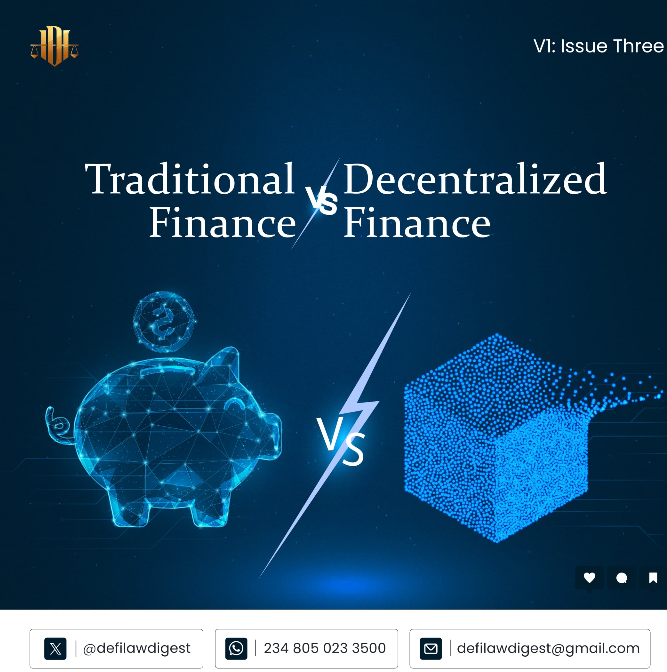By Ayomide Ogunsakin
At its core, DeFi presents a paradigm shift in financial systems as we know it. So unlike TradFi which relies on intermediaries —banks and governments— DeFi is disruptive!
DeFi leverages on blockchain and smart contracts to enable peer-to-peer transactions.
This eliminates the need for intermediaries, reduces the cost of banking services and enables financial autonomy for ALL!
For better understanding, here’s a comparison of the features of both financial systems.
→ Under TradFi, financial assets are held in the custody of regulated service providers who process transactions and other financial activities on your behalf.
DeFi, on the other hand, offers complete control of funds, which can be stored in non-custodial wallets, hardware wallets, or on smart contract-based escrows and in this case, transactions are automatically executed by smart contracts.
→ The unit of account in TradFi is denominated in fiat currencies, but the unit of account in DeFi is stored in cryptocurrencies, stablecoins, tokens and other digital assets.
→ Service providers in TradFi strictly follow rules laid down by the government i.e, Central Banks, and other financial authorities like the SEC.
But in DeFi, rules and decisions in DeFi protocols are made by the developers and token holders themselves, who exercise voting rights in entities known as Decentralized Autonomous Organizations (DAOs).
→ In TradFi, investments are guided by consumer protection laws and anti-fraud enforcement measures to ensure investor protection.
With DeFi, however, just as you enjoy total control of your funds, you also assume ALL risks attached to trading or investing in tokens, by yourself.
Although there are also DeFi insurance platforms to shield users from losses, it is still advisable to Always DYOR—Do Your Own Research!
A plethora of DeFi research tools exist to help you make safe and well informed investments in viable tokens.
→ Finally, TradFi service providers demand identity verification and the collection of personal data, as may be permitted by national privacy laws.
To open a bank account for example, you need to provide a lot of personal information like your address, BVN, National ID and other KYC details.
DeFi on the other hand, has anonymity as one of its attractive features.
In addition to decentralization, DeFi offers its users complete anonymity while making transactions, with only their wallet addresses and transaction IDs being verifiable.
It’s also important to note that while this anonymity may have some benefits, it is also a primary factor that has enabled several hacks and illicit activities leading to loss of millions of dollars on different DeFi protocols.
_Ayomide Ogunsakin, the brain behind the DeFi Law Digest, is a law undergraduate at the Obafemi Awolowo University (OAU), Ile-Ife. She can be reached through email: defilawdigest@gmail.com_
Dear readers, we really need your support to keep on serving you with authoritative, truthful, and juicy stories everyday. For your support, please reach out to the editor @gavelinternational66@gmail.com

